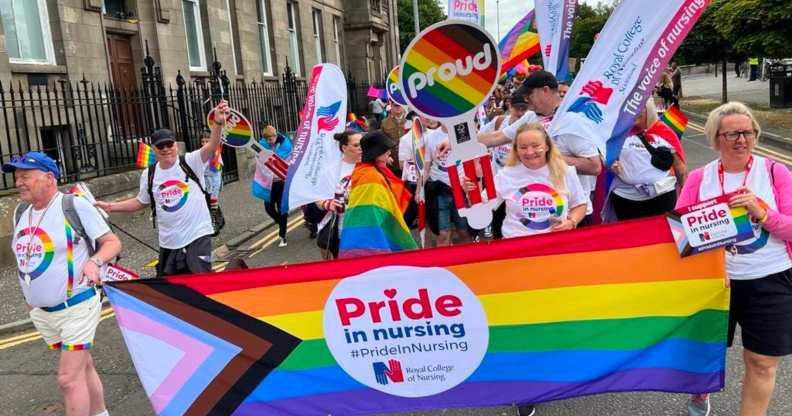Royal College of Nursing members demand resources to better support LGBTQ+ hate crime victims

RCN members are calling for better support for nurses caring for victims of hate crimes. (Supplied/RCN on Facebook)
Members of the Royal College of Nursing have demanded action to ensure nursing staff are better able to support victims of LGBTQ+ hate crime who may come into their care.
On May 16 at the RCN Congress in Brighton, members of the Royal College of Nursing – which is the UK’s largest union and professional body for nursing – tabled a discussion on the role of nursing in supporting members of the LGBTQ+ community who are victims of hate crime.
Following harrowing stories of bigotry faced by both patients and staff, including the homophobic abuse experienced by a patient discharged to a care home and a patient who refused to be treated by a trans nurse, members voted to make the debate a resolution.
They overwhelmingly passed it and issued an official call on the RCN council to take action to ensure nurses can provide adequate support to LGBTQ+ victims in their care.
Jason Warriner, who has worked as a nurse for a number of years and is involved in LGBTQ+ activism within the RCN, told PinkNews this resolution is important because often when people think of treating hate crime victims they “immediately jump” to urgent care.
However, Warriner pointed out that this is not always the case and nurses work in a huge range of settings where they come into contact with victims, including at the GP, in a sexual health clinic and out in the community.
“That’s where they may pick up on something and start a conversation,” Warriner explained.
“The person may be getting harassment from their neighbours or maybe the hate crime happened a number of years ago.
“So, it’s making sure that nurses have got the knowledge and the skills to signpost people to relevant support services, whether that’s the police, to report it through to a local LGBTQ+ community organisation or a charity somewhere like Gallop.”
The response from RCN members to the resolution has been positive, “warm and supportive”, although a number of people did not realise hate crime was still a thing which impacts LGBTQ+, Warriner said.
“A lot of people shocked the stats, really shocked at seeing the increase,” they explained.
“People think that equality is here; we’ve got marriage, civil partnerships and they think the world is okay, but it’s not.”

Warriner added: “As a college, we’ve still got to tackle homophobia and transphobia within nursing, and within the RCN as well.
“I was the first out gay man to be elected as chair for College Nursing Congress and the volume of homophobia I got, and this was in the mid-2000s, was huge.”
“It is a motivation for me that I’ve seen the difference we’ve done over 20 odd years, but as a college we’ve still got a long way to go,” the nurse continued.
For Warriner, the reality of training nurses in this area would involve a “whole mixture” of different elements, including online learning resources, publications which can be shared in care settings and equality, diversity and inclusion training.
The next step is for such training to be implemented by the nursing body.
Commenting on the resolution, RCN diversity and equalities co-ordinator Bruno Daniel said: “The increase in LGBTQ+ hate crimes is deeply alarming but sadly so is the reality faced by the UK’s LGBTQ+ community.
“The victims of homophobic or transphobic hate crimes are loved ones, colleagues, families, friends and neighbours who may disclose their lived experiences to members of the nursing team when they are seeking care and treatment.
“Nursing staff play a vital role to treat those victims with compassion, ensure they can access vital specialist services and support, and support them to achieve justice.
“Nursing teams must have the skills and knowledge they need to provide the very best care and support.”
During the last decade, the number of hate crimes reported to police in England and Wales has increased hugely.
In 2011/12, there were 4,345 sexual orientation hate crimes and 313 transgender hate crimes and 2021/22 those figures had risen to 26,152 and 4,335, an increase of 501 per cent and 1,284 per cent respectively.
Anyone who has witnessed or experienced a hate crime is urged to call the police on 101, Crimestoppers anonymously on 0800 555 111 or visit the True Vision website. In an emergency, always dial 999.
How did this story make you feel?

